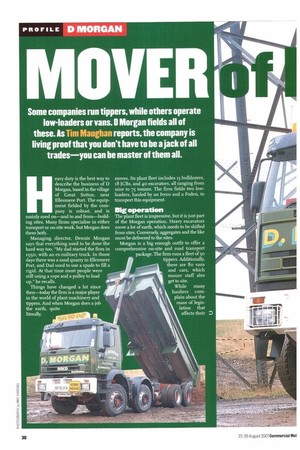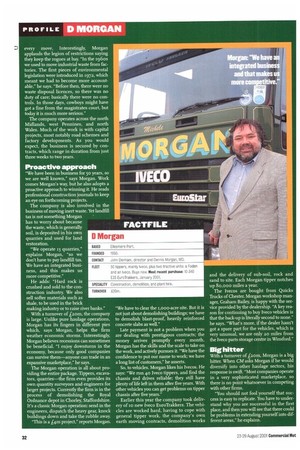MO V ER Some companies run tippers, while others operate low-loaders or
Page 30

Page 32

If you've noticed an error in this article please click here to report it so we can fix it.
vans. II Morgan fields all of these. As Tim Maughan reports, the company is living proof that you don't have to be a jack of all trades—you can be master of them all.
Heavy duty is the best way to describe the business of D Morgan, based in the village of Great Sutton, near Ellesmere Port. The equipment fielded by the company is robust, and is mainly used on—and to and from—building sites. Many firms specialise in either transport or on-site work, but Morgan does them both.
Managing director, Dennis Morgan says that everything used to be done the hard way too. "My dad started the firm in 1950, with an ex-military truck. In those days there was a sand quarry in Ellesmere Port, and Dad used to use a spade to fill a rigid. At that time most people were still using a rope and a pulley to load up," he recalls.
Things have changed a lot since then—today the firm is a major player in the world of plant machinery and tippers. And when Morgan does a job the earth, quite literally, moves. Its plant fleet includes 15 bulldozers, 18 JCBs, and 40 excavators, all ranging from nine to 75 tonnes. The firm fields two lowloaders, hauled by an Iveco and a Foden, to transport this equipment.
Big operation
The plant fleet is impressive, but it is just part of the Morgan operation. Heavy excavators move a lot of earth, which needs to be shifted from sites. Conversely, aggregates and the like must be delivered to the sites.
Morgan is a big enough outfit to offer a comprehensive on-site and road transport package. The firm runs a fleet 01 50 tippers. Additionally, there are 8o vans and cars, which ensure staff also get to site.
While many hauliers cornplain about the mass of legislation that affects their every move, Interestingly, Morgan applauds the legion of restrictions saying they keep the rogues at bay. In the 19605 we used to move industrial waste from factories. The first pieces of environmental legislation were introduced in 1972, which meant we had to become more accountable," he says. "Before then, there were no waste disposal licences, so there was no duty of care; basically there were no controls. In those days, cowboys might have got a fine from the magistrates court, but today it is much more serious."
The company operates across the north Midlands, west Pennines, and north Wales. Much of the work is with capital projects, most notably road schemes and factory developments. As you would expect, the business is secured by contracts, which range in duration from just three weeks to two years.
Proactive approach
"We have been in business for 50 years, so we are well known," says Morgan. Work comes Morgan's way, but he also adopts a proactive approach to winning it. He reads professional construction journals to keep an eye on forthcoming projects.
"We operate 13 quarries," explains Morgan, "so we don't have to pay landfill tax. We have an integrated business, and this makes us more competitive."
He adds: "Hard rock is crushed and sold to the construction industry. We also sell softer materials such as shale, to be used in the brick making industry or to raise river banks."
With a turnover ofi2om, the company is large. Unlike pure haulage operations, Morgan has its fingers in different pies which, says Morgan, helps the firm weather economic storms. Interestingly, Morgan believes recessions can sometimes be beneficial. "I enjoy downturns in the economy, because only good companies can survive them—anyone can trade in an expansive marketplace," he says.
The Morgan operation is all about providing the entire package. Tippers, excavators, quarries—the firm even provides its own quantity surveyors and engineers for larger projects. Currently the firm is in the process of demolishing the Royal Ordnance depot in Chorley, Staffordshire. It's a classic Morgan operation: send in the engineers, dispatch the heavy gear, knock buildings down and take the nibble away.
"This is a £,Im project," reports Morgan.
"We have to clear the L000-acre site. But it is not just about demolishing buildings; we have to demolish blast-proof, heavily reinforced concrete slabs as well."
Late payment is not a problem when you are dealing with prestigious contracts; the money arrives promptly every month. Morgan has the skills and the scale to take on the work, and actively pursues it. "We have the confidence to put our name to work; we have a long list of customers," he asserts.
So, to vehides. Morgan likes his Ivecos. He says: "We run 40 Iveco tippers, and find the chassis and drives reliable; they still have plenty of life left in them after five years. With other vehicles you can get problems on tipper chassis after five years."
Earlier this year the company took delivery of To new Iveco EuroTrakkers. The vehicles are worked hard, having to cope with general tipper work, the company's own earth moving contracts, demolition works
and the delivery of sub-soil, rock and sand to site. Each Morgan tipper notches up 8o,000 miles a year.
The Ivecos are bought from Quicks Trucks of Chester. Morgan workshop manager, Graham Bailey, is happy with the service provided by the dealership. "A key reason for continuing to buy Iveco vehicles is that the back-up is literally second to none." he says. "What's more, if the dealer hasn't got a spare part for the vehicles, which is very unusual, we are only 20 miles from the Iveco parts storage centre in Winsford."
Big hitter
With a turnover of i2om, Morgan is a big hitter. When CM asks Morgan if he would diversify into other haulage sectors, his response is swift. "Most companies operate in a very sophisticated marketplace, so there is no point whatsoever in competing with other firms.
"You should not fool yourself that success is easy to replicate. You have to understand why you are successful in the first place, and then you will see that there could be problems in extending yourself into different areas," he explains.




























































































































